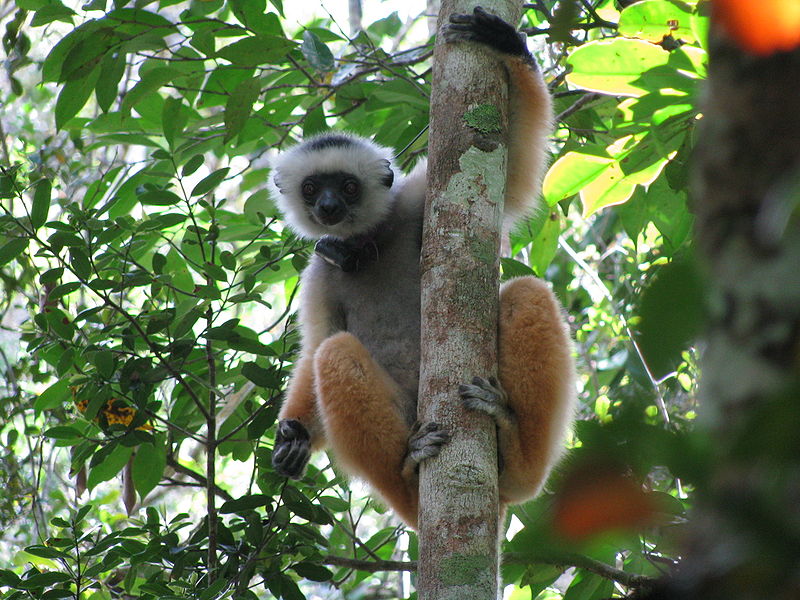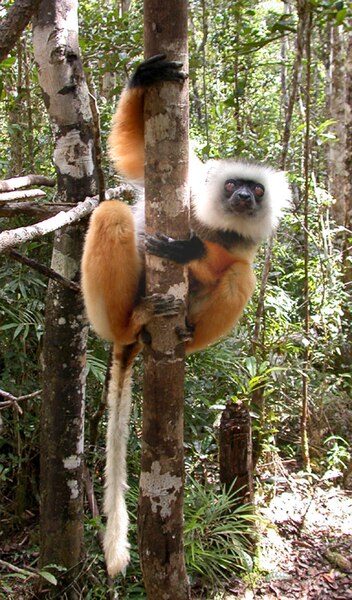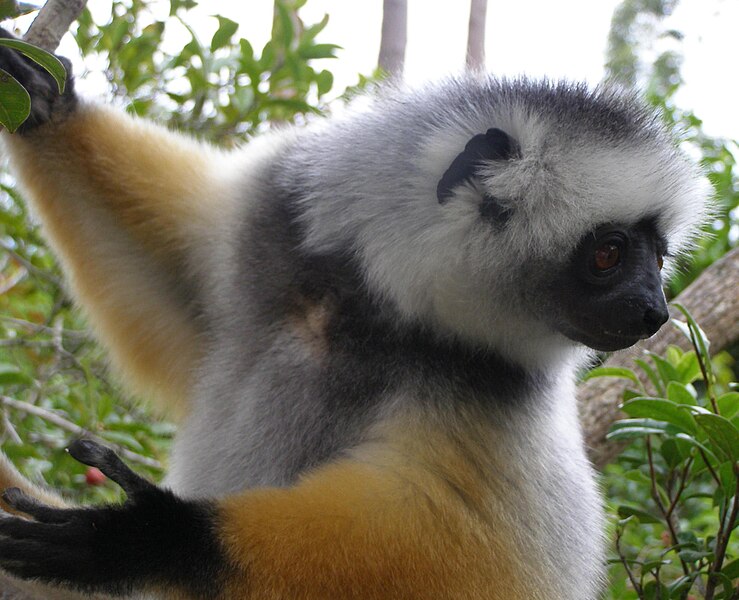.

From the arboreal sleep nest in which had passed a fifty-five million year rip van winkle nap out of the madding fray of evolving there came for these creatures of the once isolated high green rain places a rude entry to the modern world of deforestation, entrapment and bounty hunting,
a sad story toward the end of which the remaining families in this once abundant chain of being are now numbered in the mere dozens and handfuls,
therefore let us pause to lament for them and then pause again to revere in astonishment their beauty and agility, their soaring magnificence,
their ability to climb and leap and fly through air that is the innate skill perhaps instilled by a diet that for millennia has centered on two specific leaf foods,
for vegetarians are the true great athletes of the earth, absent the flaw in the carnivore which is the original sin in creation,
but nevermind for the moment, let us pause, experience the bliss of what has come and gone, as if we could take the moment of all gift and freeze it at the brink of all loss, hold it in the mind, but not touch it,
for the one knowledge we have that is worth keeping is the knowledge that our touch destroys and has always destroyed,
still this marvel of creation springs from the trunk of the tree in a soaring leap toward heaven that skywrites in an impossible paradise this noli me tangere for us to read here in the depths of our invincible ignorance forever,
from the elevated vantage of a sensory awareness infinitely beyond ours looking back at us in eternal innocence as if offering an inconceivable permission,
seeing us in our ruined place, this place we have made, here where we are, unknowing,
still wondering at this diadem in the crown, this jewel, this godly departing animal that is always preparing to push off, to spring and to leap into a future never to be known
Diademed Sifaka (Propithecus diadema), ready to push off and leap, Mantadia National Park, Madagascar: photo by C. Michael Hogan, 2006
Diademed Sifaka (Propithecus diadema), sitting, Mantadia National Park, Madagascar: photo by C. Michael Hogan, 2006
Diademed Sifaka (Propithecus diadema), with radio collar, Andaside-Mantadia National Park, Madagascar: photo by Karen Coppock, 2007
Diademed Sifaka (Propithecus diadema): photo by Tom Junek, 2003
Diademed Sifaka (Propithecus diadema): photo by Tom Junek, 2003
Diademed Sifaka (Propithecus diadema): photo by Tom Junek, 2003
Diademed Sifaka (Propithecus diadema): photo by Tom Junek, 2003
Diademed Sifaka (Propithecus diadema), closeup, Mantadia National Park, Madagascar: photo by C. Michael Hogan, 2006






Dear Tom,
ReplyDeleteThanks for this beautiful poem, such great photos, your diademed sifaka perhaps echoed here in this "silhouette of bird on branch" ---
2.13
pale orange of sky on horizon above still
black tree, silhouette of bird on branch
in foreground, sound of wave in channel
the ways of the word itself,
two incidents in mind
thought is seen, vice versa,
return to the picture
silver of sunlight reflected in channel,
sunlit white cloud to the left of point
the eyes tell.
ReplyDelete'looking back at us in eternal innocence as if offering an inconceivable permission' -
ReplyDeleteperfectly said. Wonderful pictures also!
The purity of nature turned into sacrifice by the most twisted mind nature itself has created: man.
ReplyDeleteI don't know about all that but...
ReplyDeleteI will share something I have found to be useful.
I don't have any messing with these literary magazine editors anymore. I pose them the question: if a marmoset had a fight with a weazel, which would be victorious?
If the editor answers weazel, only then do I trust his judgement; and only then will I submit any work to his/her magazine.
This, I have found, is the best way to deal with editors these days.
The jewelled Sifaka jumps into the future with determination, of course. But he has looked where he is going to land; and executed the leap to the next branch with a carefully calculated meld of power and accuracy of movement.
Mankind, however, leaps with the arrogance of an Oliver Hardy - clumsily landing arse-first in a barrel of water. And in his arrogance, he is the only one who cannot see the hilarity of his own folly.
Steve,
ReplyDeleteWhat is it about the way of the word with the colours of time?
"return to the picture"
This morning, with your lines, I am coming down to the Bolinas lagoon from the highlands of Madagascar, almost like a man walking into his living room (which is what, unbelievably, Trotsky said about the feeling of reading "Journey to the End of the Night").
gamefaced,
ReplyDeleteAbsolutely. Everything gorgeous and full of springing power. But the eyes! Looking right through us.
Humans share with lemurs a mutual forebear, a squirrel-size mammal that surveyed the tropical forests of fifty to sixty million years ago with forward-facing eyes supported by a pillar of facial bone like the one we can feel at the edge of our own eyes.
Looking back at us from our own eyes from before there was time to worry about.
Leigh,
ReplyDeleteWell, of course it is a permission they have no choice but to grant. When they are caught by hunters and trapped and caged, they can be snappish, naturally. As of course would be any terrified creature. Particularly mothers with their young. Mothering and nurseries and rearing of young are central to the bonding of social units. (As are troop cooperation and defense guilds.) Matriachic structures are not uncommon among lemurs.
Once upon a time their main worry was the one major carnivorous predator of the island, the mongoose.
Now of course it's a much more fearsome enemy.
Lucy,
ReplyDeleteSometimes I wonder if Dame Nature should really be blamed for the mind of man. I almost feel as though man may have invented that himself.
Ray,
ReplyDeleteAnd amen to that last bit.
My favourite weasel is actually the Least Weasel.
Though not much of a weasel, he is the more alert for all that.
He is on the lookout.
As of course all good editors ought constantly to be.
And handsome as well. Of all editors perhaps that cannot be said.
Tom,
ReplyDeleteWelcome back to the world of the lagoon, we've missed you, gone so long in Madagascar -- but your dispatches from the front are being read with great interest and pleasure. Meanwhile, another 'sighting' from this vantage point (i.e., 'here') ---
2.14
first grey light in sky above still black
trees, red-tailed hawk calling on branch
in foreground, sound of wave in channel
the right side for the left,
concept of the energy
follows motion, point there,
changed in its motion
silver of sunlight reflected in channel,
sunlit grey clouds to the left of point
Stephen,
ReplyDeleteSo beautiful, the ongoing of the world.
Ah, fifty five million years is a long time, but that is what it took to create this other beauty here.
I can see your wonderful sequence almost matching that.
Speaking of being in and beyond and before time -- one of those proto-Miltonic choice sets, like freedom, fixt fate and absolute foreknowledge -- I'm not sure where our particular form of parallel-universe-infinitely-repeating-itself timelessness would fit in...
(I am sure however that, as I have just now noticed, we have somehow reached the one year birthday of this blog; and on this small occasion, it would wish to express its humble thanks to the kind friends who have encouraged it to exist. Hopefully it will have served some purpose(s) for someone(s). Where else after all could one have had so many channels at one's disposal?)
I was swinging through the trees with you. It was a pleasure.
ReplyDeleteAnd the vegetarian line made me think that plants want to live too. Regardless, my hat is off to anyone who can resist a steak. I am not strong enough.
Otto,
ReplyDeleteWow, this plunges me into an ethical dilemma fog.
No, wait, I think it's a pseudo-ethical botano-historical morass, filled with peasoup quicksand.
Belch, hiccup.
But hold it for a sec. Just considering this:
"Plants eavesdrop on one another benignly and malignly. As they described in Science and other journals, Dr. De Moraes and her colleagues have discovered that seedlings of the dodder plant, a parasitic weed related to morning glory, can detect volatile chemicals released by potential host plants like the tomato. The young dodder then grows inexorably toward the host, until it can encircle the victim’s stem and begin sucking the life phloem right out of it. The parasite can even distinguish between the scents of healthier and weaker tomato plants and then head for the hale one."
That almost makes me think all those green growing things might be baby triffids in disquise, more menacing than we had ever suspected.
Scarf those malign greens before they suck the life phloem out of their next innocent victim!
(It's a relief by the way to hear that the old do not have exclusivity when it comes to doddering, there appear to be young dodders as well.)
In any case, Herr Otto, many thanks for the scientific research.
I spent the weekend with Leap: Diademed Sifaka, this morning with Vigilant: Least Weasel, and have so far shared Leap with Caroline. We both share the other Beyond The Pale readers' amazement with Leap and, I expect, their gratitude for its publication. It made me think (among many other things) about the work done by Farm Sanctuary, a remarkable New York State-based organization we support.
ReplyDeleteThe web page format you're using allows the poem and images to fully present themselves in a way I never anticipated before coming to Beyond The Pale and I'm wondering what sort of changes you're contemplating making when you eventually (as I assume you will) transfer the poems to book pages?
Tom,
ReplyDeleteThanks as always for all such thoughts, much appreciated 'way out here' (where one wonders who might ever read such diurnal dispatches, or have some words in response to them. Your 'shift' (is it?) in these last two days of mid-February to previously 'unknown' creatures -- diademed sifaka, least weasel -- is also now a part of the morning pantomime (the sparrows and blue jays seem to approve).
Curtis,
ReplyDeleteI am happy to have helped to inspire you and Caroline to share a weekend leaping through the trees.
Thanks for noticing the aspect of this blog that is in fact the whole point of it, the ongoing ekphrastic dialogue between images and words.
As it happens I am a bit bewildered as to how the look and feel of this might ever be transferred to another medium. Alas, for now, it's something I haven't figured out. A book of simply the texts would of course lose half the conversation. On the other hand, with books one can impose a sequencing, or allow conversations between the texts. Some people might consider it a relief not to have the images butting in. (??) Some people would perhaps prefer to hold a book in their hands. At any rate, the first attempt to do a transfer of the blog texts to book (without the images of course) are these. (As I have not yet held either of them in my hands, I can't yet tell you how "different" they might feel.)
Feeling for the Ground
Something in the Air
Steve,
ReplyDeleteIt's funny, way over here I don't know that anyone is getting it either. About all I know is that a large number of people from all over the earth are coming to look at/use the pictures.
I had a bit of a spell of "creatures" some time back. Here were two:
Binturong
Honey Badger
Wonderful about the "morning pantomime"!
Tom, thanks for links to Binturong and Honey Badger, (left you short note there), what a find on a now foggy morning. . . .
ReplyDelete